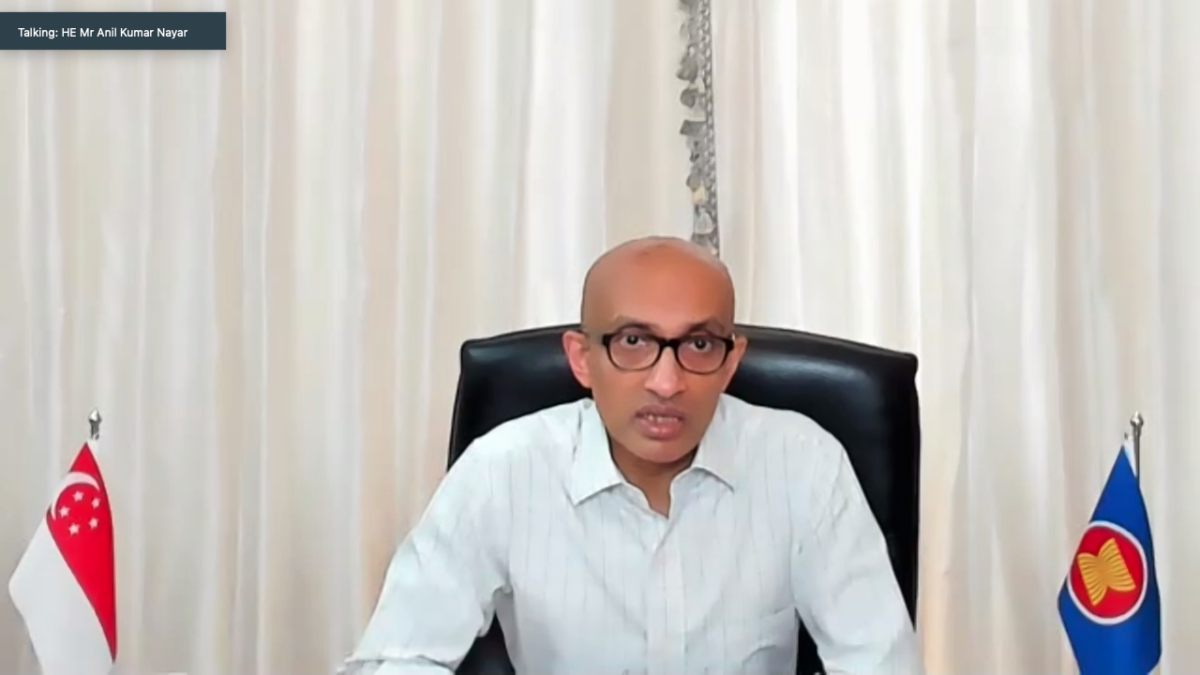SCCI Investment and Business Webinar
JAKARTA -Over the last decade, Indonesia has been a close partner for Singapore both in terms of government to government and business to business links. While Indonesia has not been able to attract interest in traditional sectors such us manufacturing, property and electronics from Singapore during the pandemic, new sectors such as technology, lifestyle, food and healthcare have emerged as more Singapore investors are looking at a longer-term perspective.
“There is no doubt that Indonesia offers unrivalled opportunities for Singapore-based businesses, in particular SMEs in several sectors,” said Shoeb Kagda, chairman of the Singapore Chamber of Commerce Indonesia. “It’s not just the size of the Indonesian market that makes it attractive. It is the fact that the country has a vibrant entrepreneur and business community; it has a sizeable consumer class and in my view one of the few markets in the world that offers entrepreneurs the opportunity to pilot projects and ideas and scale up in a short time span.”
“In sectors such as education, healthcare, retail, transport and logistics, manufacturing, finance, tourism, the country is ready to adopt new technologies and invite fresh investments. There are more than 40,000 SMEs in Indonesia, many of them seeking JV partners across the broad spectrum of the economy,” he noted.
H.E. Anil Kumar Nayar, Singapore Ambassador to Indonesia said during recent webinar held by the Singapore Chamber of Commerce Indonesia (SCCI) that over 2020, Indonesia remained one of the top and most important markets for Singapore-based companies. Despite a very tough and challenging time, realized investments from Singapore to Indonesia reached close to US$10 billion over the last year. That was an increase from the previous year even with the disruption and problems caused by Covid-19 where people are not able to visit each other as much as they would like to.
“As you know for Singapore, Indonesia is growing, has a young population and presents great economic potential in many areas. We all know that Jakarta is the nerve center of Indonesia for investments and companies come here, but Singapore companies have to also try to venture beyond Jakarta,” he noted.
“We are looking at the longer term perspective which means our companies that come here the focus is on whether there is something we can do over the long term, whether this is sustainable, whether this will create jobs here in Indonesia which we think are going to be very positive in terms of Indonesia’s long-term growth which in return will be positive for Singapore,” he said.
There were some noticeable investments made outside Jakarta last year. First, the Kendal industrial Park in Central Java where Sembcorp Development invested has been growing. It was classified as a Free Trade Zone in December 2020 and continues to attract investments during this difficult time. Total investment in the area until today is about US$1.2 billion and created jobs for close to 9,000 people.
In addition, Singapore also has had close cooperation with Indonesia in Batam, Bintan and Karimun since the 1990s. The region continues to attract investors from abroad with the latest being a sizable project launched in 2019 by telecommunication component producer, Pegatron which moved its production facilities to Batam.
In the digital space, Singapore and Indonesia opened the Nongsa Digital Park (NDP) in Batam in March 2018. Now it has about 90 companies that include giants such as AIA and Glints while Apple has a cloud academy. The park currently employs more than 300 IT and other professionals.
Singapore has also invested in Block71, an ecosystem builder and global connector with incubators that was initiated by NUS Enterprise. With the help of an Indonesian partner, Block71 has developed in Jogjakarta, Bandung, and Jakarta. It has provided networking and business opportunities for young entrepreneurs during pandemic. Also through the Singapore Enterprise Center in Jakarta, Singapore continues to support enterprises to build up their market knowledge and identify business needs in Indonesia.
“That is just a proof that we need to take the opportunity to be better. And we should not refer to Covid-19 as a reason or excuse to do less but instead, to do more,” ambassador Nayar noted.
In the G2G sector, there has also been noticeable progress. The Singapore-Indonesia Financial Investment Treaty that was signed in 2018 was ratified in December 2020 and will soon come into effect. When it comes into force, Indonesia’s attractiveness as an investment destination is expected to be strengthened including for investments from Singapore. In addition, The Singapore – Indonesia double tax treaty (DTA) will also be ratified sometime in the future which will further encourage investment flow from Singapore to Indonesia.
In the financial space, MAS (Monetary Authority of Singapore) announced the extension of the US$10 billion bilateral financial arrangement for another year with Bank Indonesia in 2020, and has been extended every year.
Over the last year, communications between leaders, officials and business community has continued with many meetings held online. The Singapore’s Ministry of Trade and Industry (MTI) conducted six bilateral economic cooperation meetings at the ministerial level with CMEA to continue cooperation.
Slowly but surely face-to-face engagement between government official is restarting again. In January, Indonesia’s Foreign Minister Retno Marsudi and State Owned Enterprises Minister Erick Thohir visited their Singapore counterparts as well as addressed the business community.
“Both sides are still continuing to explore new opportunities. During recent meeting with the new trade minister and the new tourism minister, I detected very strong interest and commitment to push ahead and also restart form initiatives that were impacted by Covid-19,” said ambassador Nayar. “Especially with the Omnibus Law we all now waiting to see how it will be implemented and I think if we see promising signs there will be even greater business interest from Singapore. For the Singapore government, the welfare of the people is always a concern. A stable, successful, and prosperous Indonesia will always create opportunities for not just Singapore but entire region,” he concluded.

